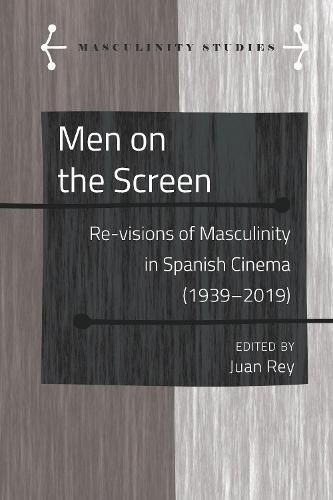Readings Newsletter
Become a Readings Member to make your shopping experience even easier.
Sign in or sign up for free!
You’re not far away from qualifying for FREE standard shipping within Australia
You’ve qualified for FREE standard shipping within Australia
The cart is loading…






This title is printed to order. This book may have been self-published. If so, we cannot guarantee the quality of the content. In the main most books will have gone through the editing process however some may not. We therefore suggest that you be aware of this before ordering this book. If in doubt check either the author or publisher’s details as we are unable to accept any returns unless they are faulty. Please contact us if you have any questions.
Cinema, whether it is understood as entertainment, business, criticism, or art, is always a reflection of the society in which it is born. Men on the Screen is a review of masculinity in cinema made in Spain by Spanish directors from 1939 to the present. The objective of this volume is, then, to observe the different types of masculinities, whose classification gives rise to a chronology that goes from the man who embodies the dream dreamt by the dictator Franco to the modern man, who is lost in his labyrinth, while also examining the repressed men, those men who have strayed and who live in the city, the rascals and braggarts, those who fight every day just to survive, the petty criminals, those men who divest themselves of the rancid national-Catholicism in order to be themselves, those who are caring, those who harass and kill their prey, the heroes, those who seduce women with their gab, corrupt politicians, those who sell their bodies, grandparents, violent and chauvinistic men, those who live in anguish for the passage of time, and even those immured by repressing and hypocritical morality. All of the masculine categories delineated above indicate that cinema is a reflection of the great changes experienced by Spanish society during these years. During this long period, Spain has gone from being a poor, isolated, dark, sad, politically and religiously depressed country to becoming a dynamic, modern country, one of the great countries of the West. And these transformations, these men, who are diverse, who are in conflict at times, and who are depressed, hopeful, hungry, consumerist, and dreamers-they are what cinema gathers. What follows next is a catalog of men who have wandered and roamed the Spanish screens.
$9.00 standard shipping within Australia
FREE standard shipping within Australia for orders over $100.00
Express & International shipping calculated at checkout
This title is printed to order. This book may have been self-published. If so, we cannot guarantee the quality of the content. In the main most books will have gone through the editing process however some may not. We therefore suggest that you be aware of this before ordering this book. If in doubt check either the author or publisher’s details as we are unable to accept any returns unless they are faulty. Please contact us if you have any questions.
Cinema, whether it is understood as entertainment, business, criticism, or art, is always a reflection of the society in which it is born. Men on the Screen is a review of masculinity in cinema made in Spain by Spanish directors from 1939 to the present. The objective of this volume is, then, to observe the different types of masculinities, whose classification gives rise to a chronology that goes from the man who embodies the dream dreamt by the dictator Franco to the modern man, who is lost in his labyrinth, while also examining the repressed men, those men who have strayed and who live in the city, the rascals and braggarts, those who fight every day just to survive, the petty criminals, those men who divest themselves of the rancid national-Catholicism in order to be themselves, those who are caring, those who harass and kill their prey, the heroes, those who seduce women with their gab, corrupt politicians, those who sell their bodies, grandparents, violent and chauvinistic men, those who live in anguish for the passage of time, and even those immured by repressing and hypocritical morality. All of the masculine categories delineated above indicate that cinema is a reflection of the great changes experienced by Spanish society during these years. During this long period, Spain has gone from being a poor, isolated, dark, sad, politically and religiously depressed country to becoming a dynamic, modern country, one of the great countries of the West. And these transformations, these men, who are diverse, who are in conflict at times, and who are depressed, hopeful, hungry, consumerist, and dreamers-they are what cinema gathers. What follows next is a catalog of men who have wandered and roamed the Spanish screens.